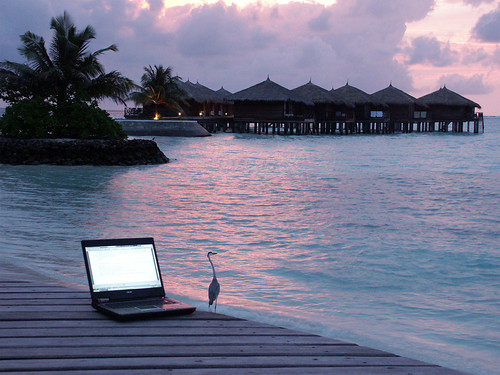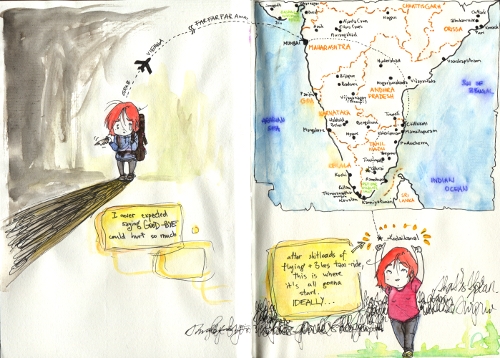Are you heading off to foreign lands and want to keep a record of your journey? In the olden days, there was only one option for penning down one’s thoughts: on paper. Nowadays, however, documenting one’s voyages has blurred over into the public realm. With the rise of modern technology came also the advent of the blog, short for weblog. With that impending journey ahead of you, which are you going to choose?
Vagabondish is reader-supported. When you buy through links on our site, we may earn a small affiliate commission. Read our disclosure.
The Definition of a Diary
In Creative Writing: A Workbook with Readings, Linda Anderson writes that:
“Diaries lie on the cusp between private and public worlds. They are a form of writing that can be seen as a personal, secretive dialogue with the self, a form of isolated reflection, or alternatively as a pragmatic exercise in revelation” (330).
In other words, a diary offers insights into the inner workings of a character. The person writing, in turn, is able to fully open themselves up to the diary. Think of Anne Frank as the ultimate example of penning down the private. (Although in the end, these intimate thoughts ended up becoming public through the published book).

Keeping Tabs in Hanoi, Vietnam © Tim Lindenschmidt
The Pros and Cons of Writing a Travel Diary
Assuming that you aren’t planning on publishing your diary, what does this kind of writing entail?
- You can be entirely honest in a diary. On the other hand, you can be a complete liar, too. Since nobody is going to read it, nobody will know, and nobody will judge you for it either. Basically, it’s all up to you.
- A pen and paper is all you need. In fact, a scrap of paper will even do — you can glue it into a book later on. No need for a heavy laptop, charger, and Internet access, which is not always that easy to find (or lug around) when traveling.
- It’s green. Ok, you will need a bit of paper. But in no way does that compare to all the electricity you would have used with a computer.
- You get offline. As Anderson puts it, a diary “offers the potential to reveal a fully fledged identity, one with hopes, doubts, petty occupations and grand aspirations” (Anderson 330). You will not only look deep within yourself, but also more closely at the local surroundings. No more pop-ups, no Facebook, no incoming mail. Just you, the diary, and the place you are in.
The Definition of a Blog
A blog is “the most notable form of modern diary entry,” according to Linda Anderson. In contrast to a diary, the blog is conscious of its readers from the very outset. Blogs, so says Anderson, are thus “more than a private record” and “can read like testimonies, commentaries, journalism or even pure fiction” (Anderson 330). The latter will depend on the writer, of course.

Blogging Alone, Maldives © Giorgio Montersino
The Pros and Cons of a Travel Blog
- People can read it. Having one subscriber, thousands, or none is not the issue. Simply putting it on the Internet potentially allows others to have access to it. Thus:
- You will have to be honest. If you write about how you trekked Aconcagua and the person next to you knows that you didn’t reach the top, the fact that you are lying will be evident immediately. However,
- You will also (most likely) censor yourself. Unless you have absolutely no issues with expressing your deepest fears online, you will be censoring yourself in a blog. A friend of mine even took her blog offline because she found that she was being too open about her relationships.
- You won’t have to send mass emails anymore. Keeping in touch with family and friends during long-term travel can be difficult. A blog allows people to follow along if, and when, they want to.
- You are tied to technology. Blogging requires a computer, Internet access, etc. Uploading pictures, too, can be quite time-consuming. So while you save time not sending out a big email, you will probably end up spending more time online formatting all that blog content. This is time you could be spending with locals and really getting to know the place you are in.
- A blog can be interactive. Not only can people follow your blog, but they can also comment on it. This can enable you to stay in touch with back home in an interactive way. Again, just be conscious of the amount of time you spend online, and off. Unless you came abroad to post “likes” on Facebook, think closely about how you balance your time.

Watercolor Travel Map, India © Frl. Schrödinger
What Is Right for YOU?
Ultimately, choosing between a diary and a blog is your decision. What’s great about today’s modern society is that the two are not mutually exclusive. When I travel, I often like to jot down notes in a private journal. Some of these will funnel into ideas for my blog and future articles, while some will remain forever in the dark (they may not even be that great, anyways). Feel free to strike a combination of both that feels right for you.
Recording your travels and thoughts can serve as a document of your personal growth. Don’t underestimate the power of a diary or a blog.
While keeping a diary is rather simple — a simple journal will do the trick — blogging software abounds. From WordPress to Blogger to Typepad, the options are many. There are even portals such as “Off Exploring” which allow you to blog online — “it’s harder to lose and you’ll never run out of space,” reads the advertisement. Moreover, post-travel, you can get your blog printed as a book. This way, your blog entries, photos, and messages, are treasured forever. It’s the nearest you’ll come to a “public” diary.
A Few Final Notes
- The importance of recording one’s travels. Keeping a diary or blog takes time. I always set out at the beginning of a trip, promising myself that this time, I will write about it all. Rarely does that ever happen, and back home, I look back, wishing that I had written down what I did that day. Recording your travels, and especially your thoughts, can serve as a document of your personal growth. Don’t underestimate the power of a diary or a blog.
- Don’t make your travel too transparent. In the 21st century, blogging has become all the rage. However, as with everything, just use your common sense. You don’t want to end up like the couple in the Bahamas, who got put in jail for breach of fisheries regulations. All because they shared their “exclusive” stories online”¦


